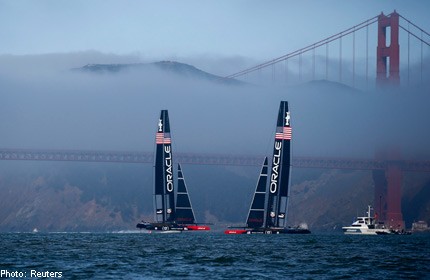Sailing: Just marvel at comebacks for they never make sense


After the comeback, after the improbable writing of history, after the extraordinary act of will, often the victorious team are at a loss for words. They cannot adequately explain the comeback for it is beyond even their own realm of experience. It as if they have discovered a new frontier for themselves. As Jimmy Connors said after yet another grand revival: "Did I really win this match?"
Did Team USA really win the America's Cup?
The fundamental beauty of the comeback is that it never makes sense. There is a point during a contest when we insist a team have no chance.
Their opponent is playing too well, the gap is too large, the time is too short. Then they win and we find comfort in the word "miracle" as if no logic can suffice for what has unfurled. Like in San Francisco Bay this month.
It is irrelevant if you come from a landlocked nation and cannot tell catamaran from canoe. To be 1-8 down and win a contest 9-8 as Team USA did at the America's Cup is impressive to anyone who can count. If you factor in the value we put on momentum and psychological advantage, it is startling. Reality in sport has again defeated the imagination.
Statistically one presumes such a win was inevitable. If you play sufficient matches, a team will eventually come back from 0-3 down at half-time in a Champions League final as Liverpool did. Or return from 10-6 down on the last day to win the Ryder Cup as Europe did in 2012.
But mathematics is a dry calculation in a contest of spirit. Why one man's will won't buckle like a cheap sail in a grim wind is a philosophical mystery. Why Muhammad Ali, exhausted against Joe Frazier in 1975 in Manila, could find another wind in the later rounds, is a discovery of desire we cannot fully account for.
Certainly athletes are conditioned to keep driving themselves for there is an honour attached to it. Fathers applaud courage, coaches demand it and locker room walls are tattooed with it. Who doesn't know yet football coach Vince Lombardi's words: "The real glory is being knocked to your knees and then coming back."
But even as teams build cultures of toughness and psychologists counsel athletes, not every scenario can be replicated. You can't simulate vomiting in a fifth set as happened to Pete Sampras in 1996 at the US Open against Alex Corretja. You can't imagine being 1-8 down in the biggest boat race in the world and thus you can't ever be prepared for it.
Sampras had no one to lean on yet was responsible for no one but himself. In Team USA, men held each other up and dejection was not worn alone, yet convincing a varied group to stay focused is a team's unique challenge. Perhaps in an absurd situation they found comfort in sports' most familiar cliche: one race at a time.
These sailors stand tall and unique in sports' catalogue of the brave and the roused. Losing footballers, for instance, find inspiration from the half-time Churchillian oration. It is a speech that is an immediate response to adversity and is designed to have an immediate effect. But these sailors won those last eight races over seven days. No single speech would suffice. No, here, unlike the short intensity of four tennis match points faced, a longer and more sustained inspiration was demanded to return from 1-8.
It is not just the distance they soldiered back from, but the absence of room for error. In the movie Miracle, based on America's ice-hockey upset of the majestic Soviet Union at the 1980 Olympics, the US coach tells his team: "If we played 'em 10 times, they might win nine. But not this game. Not tonight."
For sailing's Team USA it was the reverse, they had to win every day. At 1-8, the next loss became the last loss. They had to be perfect and if it was draining, and edgy, it perhaps also brought clarity. To know you have no other option but to win is oddly liberating.
In time we might find there was a pivotal point during this series when anxiety reversed itself and began to flood Team New Zealand. A Cup victory, once inevitable at 8-1 for them, must have shifted with every defeat - New Zealand will probably win, they must win, they've a good chance to win, how can they not win?
As the gap closed, did karma make an appearance: Maybe it's not our Cup to win? Did the great advantage they owned ironically morph into their burden: How can we lose from here?
In the end, as much as it was a beautiful day it was a poignant one, for in the wake of a miracle is always found heartbreak. Only in sports' paradoxical world can a team that couldn't lose suddenly forget how to win.
rohitb@sph.com.sg

Get a copy of The Straits Times or go to straitstimes.com for more stories.